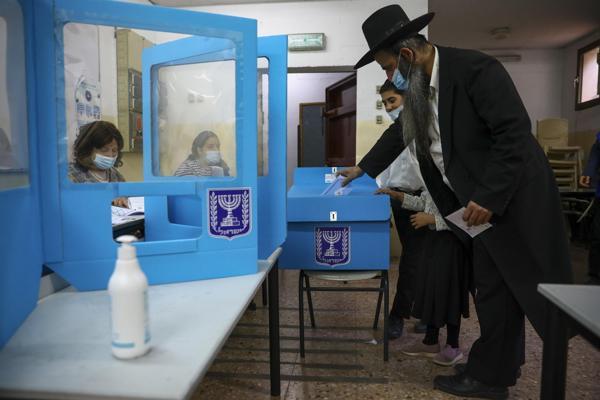Israel voters take fourth shot at deciding Netanyahu’s fate
JERUSALEM-Agence France-Presse


Israelis were voting on March 23 in their fourth election in less than two years, with the nation still divided over whether Prime Minister Benjamin Netanyahu deserves to remain in power.
Israel’s longest-serving premier, and still its most popular politician, has for several years proved unable to unite a stable governing majority behind him.
He is again facing an electorate of some 6.5 million registered voters, after leading a successful coronavirus vaccination effort that has already fully inoculated half of Israel’s roughly nine million people, a pace envied by much of the world.
But while polls project his right-wing Likud will win the most seats on Tuesday, 71-year-old Netanyahu will need coalition partners to secure a majority in the 120-seat Knesset.
That means Israel is looking at three possible outcomes: another coalition under Netanyahu, an ideologically divided government united only by its opposition to him, or a looming fifth election.
Netanyahu is currently on trial on charges of bribery, fraud and breach of trust - allegations he denies, but which have helped fuel a protest movement with weekly rallies outside his Jerusalem residence.
The prime minister has said he will not seek to block the trial and is looking forward to being exonerated, but critics suspect that if he earns a majority, he may seek parliamentary action to delay or end the process.
But to form a government, Netanyahu will have to come to terms with small factions that control a handful of seats, likely including a new extremist, far-right alliance called Religious Zionism.
If Religious Zionism crosses the 3.25 percent support threshold, as polls predict, it will send to parliament Itamar Ben-Gvir, who has voiced admiration for the mass-murderer of 29 Palestinian worshippers in Hebron in 1994, Baruch Goldstein.
Even top Likud member and energy minister Yuval Steinitz said it would be improper to sit with Ben-Gvir, who has vowed to secure a prominent role in government before agreeing to join Netanyahu.
Israel’s electorate has migrated rightward since the turn of the century, following the failed Oslo Peace Process and the ensuing Palestinian uprising, or intifada.
Polling suggests right-wing parties could win up to 80 seats, meaning that "whoever becomes prime minister, the country is likely to espouse a right-wing direction", said Dahlia Scheindlin, a political analyst and pollster.
For Netanyahu’s main challenger, the centrist former television news anchor Yair Lapid, that means any path to power will require an alliance with Netanyahu’s rivals on the right.
That list includes former senior Likud member Gideon Saar, leader of the New Hope party that could win up to 10 seats, and who has ruled out joining a Netanyahu-led government.
Lapid would also likely align with religious nationalist Naftali Bennett.
The multi-millionaire former tech entrepreneur and one-time Netanyahu protege has fallen out with the prime minister and hammered him during the campaign, while not ruling out a reunion.
Bennett’s Yamina party is, therefore, seen as a likely kingmaker.
Lapid has said he will not insist on being prime minister in an anti-Netanyahu coalition if that helps unseat the premier.
March 23's election was forced after Netanyahu triggered the collapse of a unity government he had formed with his rival Benny Gantz following the three previous inconclusive elections.
Gantz, largely abandoned by his supporters after agreeing to sit with Netanyahu, said he joined a Netanyahu-led coalition to give Israel desperately needed stability as the pandemic was gathering pace last year.
But their coalition agreement called for Netanyahu to hand power to Gantz after 18 months, something observers of the prime minister correctly predicted he would never do.
If Netanyahu can’t get to 61 seats in this vote and his opponents cannot find common ground, a fifth election in three years is possible.
And, said political analyst Gideon Rahat, it’s a prospect that may suit Netanyahu, whose primary objective is to stay in power, as caretaker premier awaiting yet another election if necessary.
Netanyahu "can easily go to a fifth, sixth or seventh election", Rahat said.
